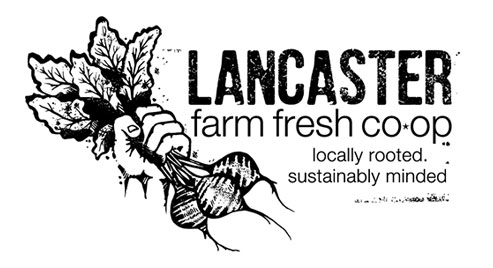CSA FAQ
Everything that you need to know about our CSA.
What is CSA?
Community Supported Agriculture, or CSA, is a program wherein individuals and families can purchase a weekly share of the harvest, which allows that person or family to participate in the season’s harvest and receive vegetable items appropriate to the season as weeks progress. Many CSA members find their vegetable repertoire grows with the season as they begin to receive some our personal favorites including unique vegetable varieties and beautiful heirlooms!
CSA members pay for their shares when they register for their share(s) at the beginning of the season and receive weekly portions, or shares, for the duration of the season. Of course, the amount of produce they receive is based on which, and how many, shares they purchased at the beginning of the season. Included in this experience are the intrinsic risks and benefits of small-scale organic farming as affected by the weather of the particular season.
Unique to our CSA, compared to, say, a single, small farm CSA, is the variety of vegetable items we can offer our share holders throughout the season thanks to our extensive base of farmers! Additionally, thanks to our large farmer base, the risks we mention and you may hear about elsewhere when considering a CSA membership, are much lower because of our large (100+!) farmer base. For example, if one farmer is experiencing tomato blight it is easier for us as a cooperative to manage this for your CSA by looking to a number of other farmers who may also be growing tomatoes.
Do I have to pay the total cost of my CSA share(s) up front?
The CSA model is specifically designed to be an investment in the farmer(s) growing and harvesting the foods that will be included in your CSA share(s), so paying the total cost of your CSA share(s) up front is standard protocol. These funds help the farmer be able to afford the items needed to prepare for the harvest season, including but not limited to seeds, soil amendments, tools, equipment, and energy-related costs (keep in mind almost all of our farmers start some of their crops in heated greenhouses to get a jump start on the outdoor growing season).
All of that said, we understand it may be difficult for some households to afford the total cost of one or multiple CSA shares up front. We have 2 solutions for these situations:
- If you intend to purchase more than one CSA share type, consider breaking up your purchases across multiple weeks or months, instead of buying all of your shares at one time. It’s extremely rare that we sellout of any particular share type, so there is no harm in spreading out your CSA purchases.
- If needed, we can offer a payment plan to break up your total CSA share payments. We can only offer this payment plan through manual transactions handled via email or phone call with our CSA customer service team, so be sure to email us at csa@lancasterfarmfresh.com or call us at 717-656-3533 extension 2 to purchase your CSA share(s) using our payment plan outlined below.
- There is a one-time $10 service fee for any payment plan purchase; if applicable, the one-time $15 delivery fee for sites in DC/MD/VA will also be applied to the total amount due.
- Your total amount due will be broken up into 3 monthly payments; 50% of the total amount due must be paid up front, followed by a 25% payment one month later, and a final 25% payment two months later.
- EXAMPLE: if you call us and set up a payment plan for your summer CSA shares on January 20th, you’ll pay 50% of the total amount due on January 20th; a 25% payment will be charged to your credit card on February 20th, and a final 25% payment will be charged to your credit card on March 20th.
- Please note: All Summer 2024 Season payment plans must be set up by August 1st, 2024. We are unable to accept any payment plan requests after that date.
Are LFFC member farms sustainable, organic, chemical-free?
What will my CSA share look like?
The number of vegetables in your CSA box depend wholly on which type you purchase.
Be it a small, a medium, or a large share, we always aim to include the best of our farmer’s already top-notch produce. Years of building CSA shares for our community tell us what people love most, and we’re only looking to better the CSA experience for everyone.
Our Large Produce Share harkens the fullness of a season’s bounty. Each week, it includes 10 to 12 produce varieties, so we recommend this share for families or any avid vegetable eaters who love to cook adventurously at home.
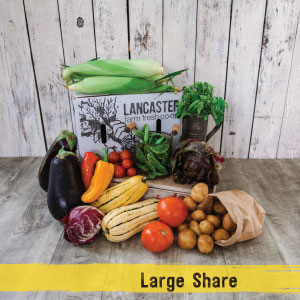
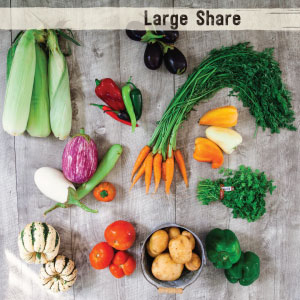
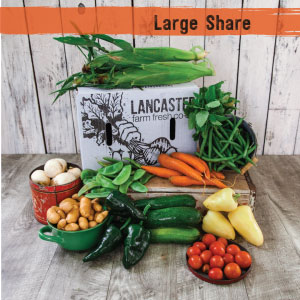
Our Medium Produce Share is abundant with the Earth’s goodness, containing 6 to 8 varieties of produce per week. This box is perfect for individuals or a pair, as there’s enough produce for nightly side dishes or smaller portions throughout each day.
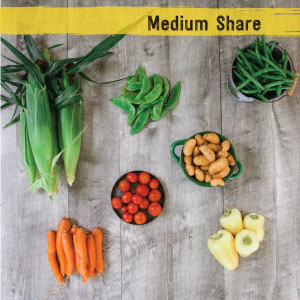
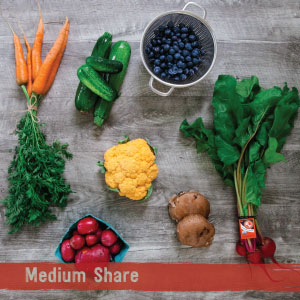
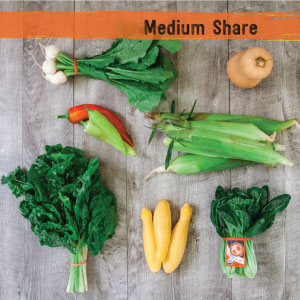
Our Small Product Share is still mighty! With 4 produce varieties, this box is a great choice for people may eat less vegetables or who are looking to supplement their weekly groceries. The small share also works well for anyone who has never participated in a CSA and is hesitant about committing to receive more vegetables; you can always call the Coop to upgrade to a medium or large share.
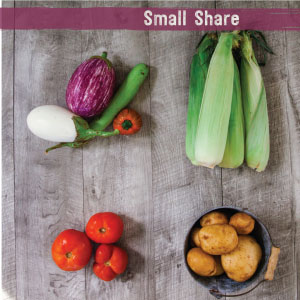
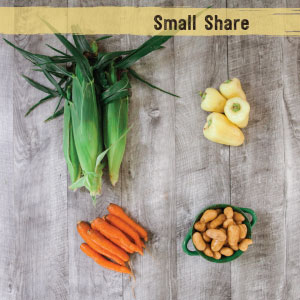
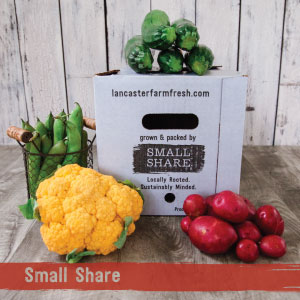
Integrated Pest Management (IPM).... what is that?
In our Mid-Atlantic region, tree fruit is extremely difficult to grow organically. With notice, some of the fruit you receive in your fruit share will be grown using an IPM program. An Integrated Pest Management is an approach of four different categories that are often described as a continuum. The four parts to an IPM growers’ program area) when to decide to take action as the sighting of one pest doesn’t require immediate action; b) after a pest is sighted, the farmer needs to monitor and identify the pest; c) practice pest prevention which may mean crop rotation and other natural methods; and d) utilizing a means of control which may include a use of pheromones to deter the identified pests, or, if natural pesticides have been deemed ineffective, then using a synthetic pesticide that is least harmful to people and the environment.
Can I place a hold on my delivery if I'm going to be away?
As a benefit for our members, Lancaster Farm Fresh CSA is pleased to offer (two) delivery holds per season. Members may choose to either have replacement boxes delivered the following week, or store credit equal to the amount of the shares put on hold. Please note that store credit will expire in 6 months of the date issued.
We ask that all members give at least 2 weeks’ advance notice for any holds. CSA cannot guarantee hold requests will be processed if the request is submitted with less than 2 weeks’ notice.
For any additional weeks that you will not be able to pick up your shares, members have the following options:
- Donate – or sell – your share to a friend or relative.
- Check with the other members at your site to see if they are interested, or know someone who would like it.
- Contact your site host to see if they will donate it for you.
What are points?
Points may be added to a member’s account if there is a need for credit to be applied. The point conversion is 1 point =$0.25 ($1 = 4 points). Points automatically expire 6 months from the date of issue. Members can use points towards purchases on our CSA store page or for CSA Shares.
How to use points:
- First, login to your account on lancasterfarmfresh.com.
- Build your cart with items and head to the billing page.
- Look for the green bar at the top of the screen. It will show you how many points you can apply to the purchase.
- To the right is a button that says Apply Discount. You will NEED to click that button; the points are not automatically applied for you.
- Once you click Apply Discount, your total will update, and you pay the reminder to finalize your order.
Your order will be placed and ready to go.
How can I plan ahead for meals and what about recipes for those unique veggies?
As a perk for our members, Lancaster Farm Fresh emails a newsletter 2-3 days prior to your CSA pickup. This newsletter includes important updates, product features, recipes, and a list of what we have planned for your box.
For those of you who like improv, surprise parties, and jack-in-the-box (the toy, not the burger – of course!), then this is a good place to stop reading. The ingredients in your CSA box will be a delightful surprise for you each week, and will help to get those creative, culinary juices flowing!
For you planners, unboxers, and Type A-ers, we’ve got you – and your dinner table – covered, so read on for the list of items we’re planning to put into your share. Grab your grocery list and open Pinterest because it’s time to start preparing for your culinary creations!
While we want to guarantee that the predicted contents listed in the newsletter are 100% accurate (we really do!), there are times when items may vary slightly. Why? Because farming is unpredictable. Sometimes harvests don’t go as planned and we have to make last-minute substitutions. What should you do? Roll with it and let your inner chef shine!
How does the price of a CSA share compare to shopping at the grocery store?
How do my CSA contents change throughout the season(s)?
Over the course of season, we grow over 400 varieties of fruits and vegetables. The list below features many of the regular crops we grow, but is not exhaustive.
We’re proud to farm in Pennsylvania, the mid-Atlantic’s agricultural breadbasket. Still, with this region’s colder winters, we do sometimes bring produce from outside the region. We work with partner farms to responsibly source fruits and vegetables that maintain the diversity of product in your CSA shares.
May:
green romaine, green leaf lettuce, bunched spinach, scallions, green butterhead lettuce, red romaine, green kale, lacinato kale, red kale, chards (rainbow, green, and red), collards, bok choy, bunched beets, fennel, bunched baby turnips, bunched radishes
June:
green romaine, green leaf lettuce, green kale, bok choy, bunched beets-varieties, green/red bunch mustard greens, radishes, fennel, rhubarb, collards, bunched carrots-varieties, red kale, lacinato kale, cauliflower, broccoli
July:
eggplant, green zucchini, yellow squash, cucumbers-slicing and pickling, cantaloupe, green beans, peppers-sweet and hot, green kale, green/red cabbage
August:
eggplant, green zucchini, yellow squash, cucumbers (slicing and pickling,) cantaloupe, green beans, tomatoes (beefsteak, roma, cherry, heirloom), watermelon, sweet and hot peppers sweet corn, yellow beans, onions, potatoes
September:
sweet and hot peppers, potatoes and sweet potatoes, bok choy, green kale, beets, lettuces, winter squash (many varieties), broccoli, bunched spinach, kales, chards, onions, tomatoes (slicer, roma, cherry, heirloom), other leafy greens
October:
winter squash (many varieties), cabbage (different varieties), beets, potatoes and sweet potatoes, broccoli, cauliflower, green kale, beets, bok choy, kohlrabi, radishes, leeks, onions, spinach, mustard greens, chards, arugula, mizuna, and other leafy greens
November & December:
broccoli, brussel sprouts, bok choy, potatoes, cabbage, winter squash (many varieties), kale, chard, mushrooms, carrots, parsnips, spinach, arugula, tatsoi, microgreens, garlic, celery, celeriac, collard greens, mustard greens, beets, cauliflower, fennel, sweet potatoes, broccoli raab, radicchio, endive, leeks, radishes, rutabagas, shallots, onions, scallions, turnips
January through April:
carrots, beets, turnips, radishes, potatoes, sweet potatoes, kohlrabi, mushrooms, onions, garlic, cabbage, parsnips, jerusalem artichokes, popcorn, bunched and loose leafy greens (kales, chards, spinach, lettuces, arugula, bok choy, mustard greens, asian greens); sometimes certified organic regionally-grown items like hot house tomatoes may be included, too
Will fruit be included?
Fruit is not typically included in our produce shares; however, when in abundance, it may be! For example, if our farmers have a surplus of berries, produce share members may receive berries in their share that week.
Fruit shares are available in the summer and fall as well. Each fruit share includes 2-3 types of fruit, or value-added fruit products, in each weekly delivery. Fruit types are also wholly dependent on our region’s weather patterns, late spring yields sweets like cherries, strawberries, rhubarb (we argue this is a fruit for fruit’s sake!) blueberries, blackberries and raspberries. Yum!
As the temperatures rise and the season progresses so does the life stage of melons! Prepare to be delighted by canary melons, cantaloupes, seedless watermelons, yellow and orange watermelons, and other exciting heirloom varieties!
Like usual, what goes up must come down—including temperatures—typically right around the time we’re ready! As those summer temperatures cool, the fruit shares begin changing, too. We begin receiving grapes, kiwi berries (one of our favorites), pears and apples all sourced from our farmers and partners—both local and regional. Fruits are either Certified Organic or raised with the environment and consumer-sensitive Integrated Pest Management (IPM) standard.
